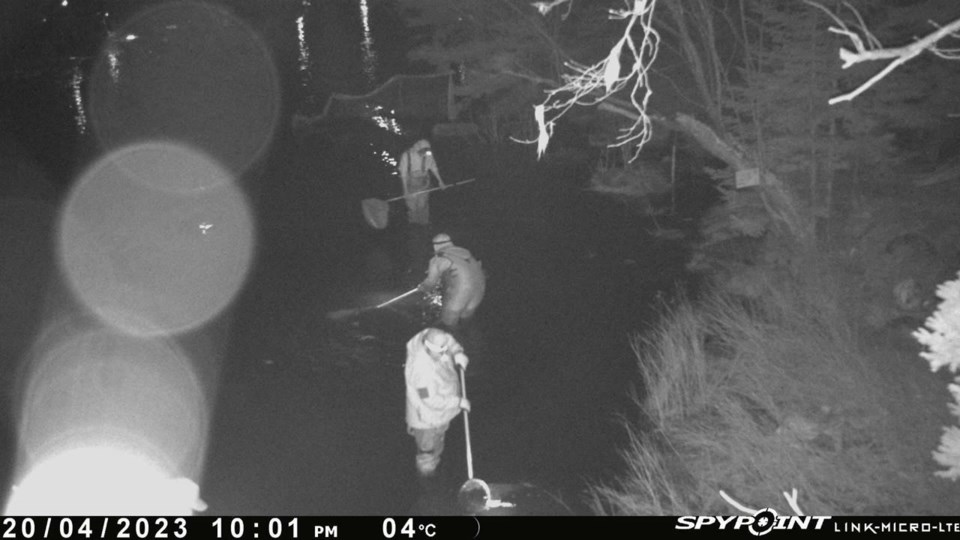HALIFAX — The office of federal Fisheries Minister Joyce Murray is rejecting allegations her department hasn't done enough to stop poachers from harming the lucrative baby eel fisheries in Nova Scotia and New Brunswick.
In a statement released late Wednesday, Murray's office said fisheries officers have continued to enforce a fishing moratorium imposed April 15 amid reports of increasing poaching and violence along tidal rivers in the two provinces.
Some commercial harvesters, however, have complained that little has been done to stop the fishing, especially during the nearly two-week strike by members of the Public Service Alliance of Canada, which includes fisheries officers. The strike started four days after the moratorium was imposed.
The tiny, translucent eels, which are worth more than $4,000 per kilogram, are fished at night in tidal rivers as they migrate inland from the ocean each spring. They are typically sold to buyers in Asia where they are grown for food. Demand and prices have risen steadily in recent years.
On Wednesday, Murray’s office said her department's officers are enforcing the Fisheries Act and working with the RCMP and other agencies to "combat illegal fishing" of baby eels, which are also known as elvers or glass eels.
"Since the issuance of the Fisheries Management Order on April 15, which closed the elver fishery for a period of 45 days, enforcement efforts have been conducted by fisheries officers to deter and disrupt unauthorized elver harvesting," the statement said.
"To maintain operational integrity, we do not disclose the number of active officers nor what specific enforcement activities they are undertaking. Fishery officers will continue to enforce the law."
Since April 15, fisheries officers have made 18 arrests and seized 6.5 kilograms of elvers, one vehicle, 15 dip nets and 22 fish traps — known as fyke nets — in Nova Scotia and New Brunswick, the statement said.
Last week, Nova Scotia's representative in the federal cabinet, Sean Fraser, said the public service strike made it difficult for Ottawa to enforce conservation rules. Fraser, a Nova Scotia MP and the federal immigration minister, said the essential services role of fisheries officers who were required to work during the strike was limited to situations where a person's life was at risk, or something of a similar scale.
Some licence holders in the fishery have been sending photos to the Fisheries Department that allegedly show people fishing for elvers despite the temporary ban.
Stanley King, owner of a licensed elver-fishing company in Nova Scotia, distributed photos on Tuesday that he says show poaching the night before on the Hubbards and Ingram rivers.
"Poaching likely also occurred on additional rivers we monitor but poachers have recently destroyed some of our cameras on these rivers," King said in an email. "This is the 16th time I've reported Elver poaching from these locations in the 17 days since the fishery was closed."
King said his camera recently captured images of fisheries officers at one river, but he said the photos were taken at 2:30 p.m., when elver fishing is typically a waste of time.
"Please consider enforcing the … shutdown," King wrote. "The federal strike is now over, so that excuse is no longer valid."
In New Brunswick, a member of the legislature from the St. George area said she was stunned on Tuesday night when she spotted about 50 people with headlamps using nets to scoop up eels in the Magaguadavic River.
Andrea Anderson-Mason, a former justice minister, said that over the past 15 years she has grown used to seeing between two to six eel harvesters in the river at this time of year. She said she called the federal Fisheries Department on Tuesday night and was told there was not enough staff in the area to respond.
"I'm disappointed because I think this was predictable," Anderson-Mason said in an interview Thursday. "I'm aware that we have a very small staff of conservation officers in my area. But I would have thought that it was predictable that this sort of behaviour could have occurred."
She said there have been rising tensions on the water as poachers have moved in to make quick money.
And given the fact that glass eels in New Brunswick can only be found in the tidal rivers of the southwest, Anderson-Mason said fisheries officers should have been deployed from other parts of the province to protect the resource.
The Progressive Conservative politician said she found it hard to believe that the federal Fisheries Department was cracking down on illegal eel fishing.
"My criticism is for the senior management at Fisheries," she said. "If they are truly concerned about the conservation of these eels, they would have been prepared to enforce the law that they put in place, which was the closure of the industry."
Meanwhile, Nova Scotia Fisheries Minister Steve Craig said he was worried about the conservation of the species.
"We need a sustainable fishery," Craig said Thursday following a cabinet meeting.
While the federal government is in charge of conservation, Craig said the province licenses the purchasing and processing of elvers and can put a stop to illegal sales.
"Anybody with a buyer's licence, they do need to purchase legally caught species and when that's not done we have the ability to put constraints on licences and to take action," Craig said. However, he said no fines or penalties have been imposed this year.
There are 44 valid licences for processing in Nova Scotia, but only three are currently active, Craig said.
This report by The Canadian Press was first published May 4, 2023.
— With files from Keith Doucette in Halifax.
Michael MacDonald, The Canadian Press
Note to readers: This is a corrected story. A previous version said the minister's statement was released Thursday.



